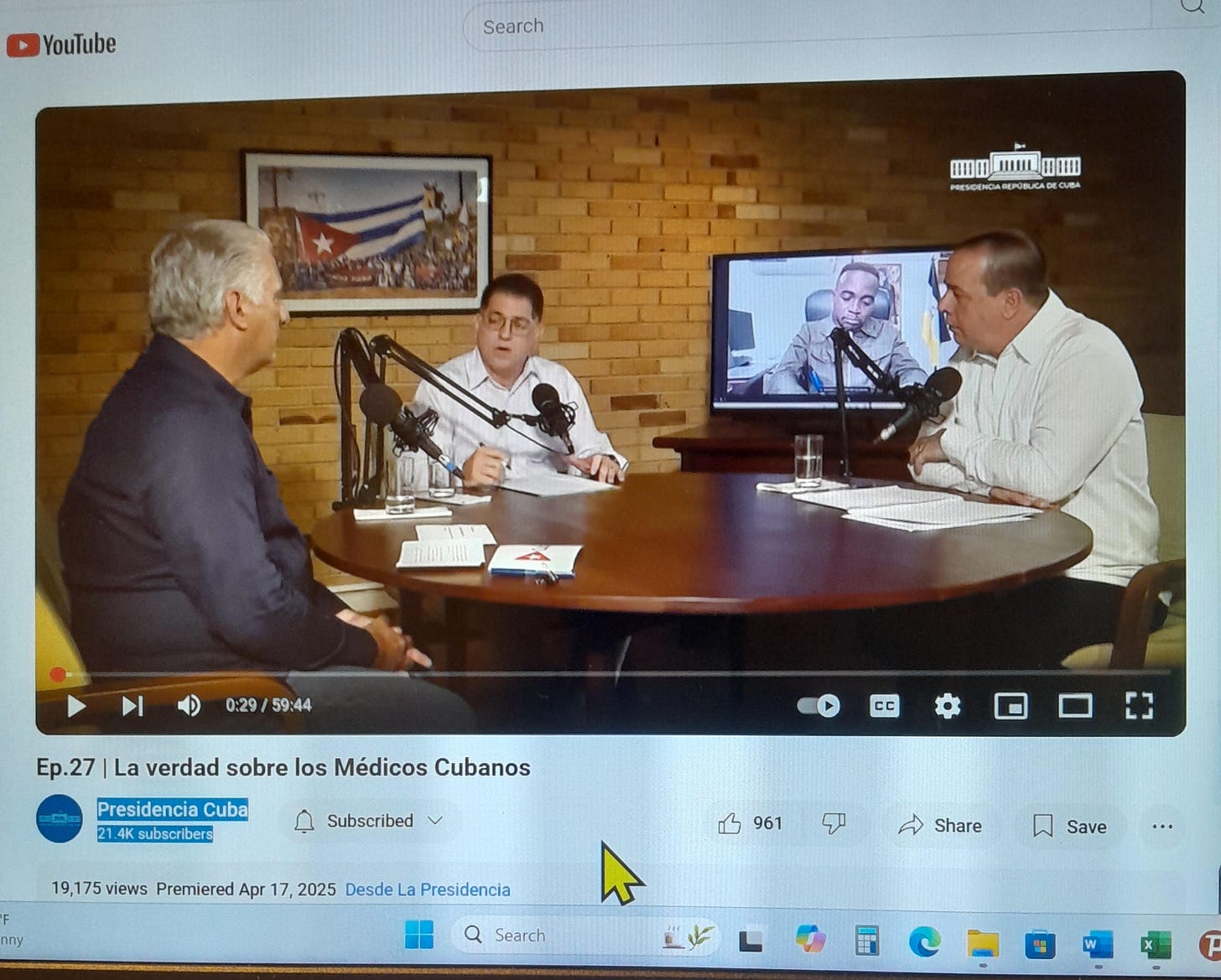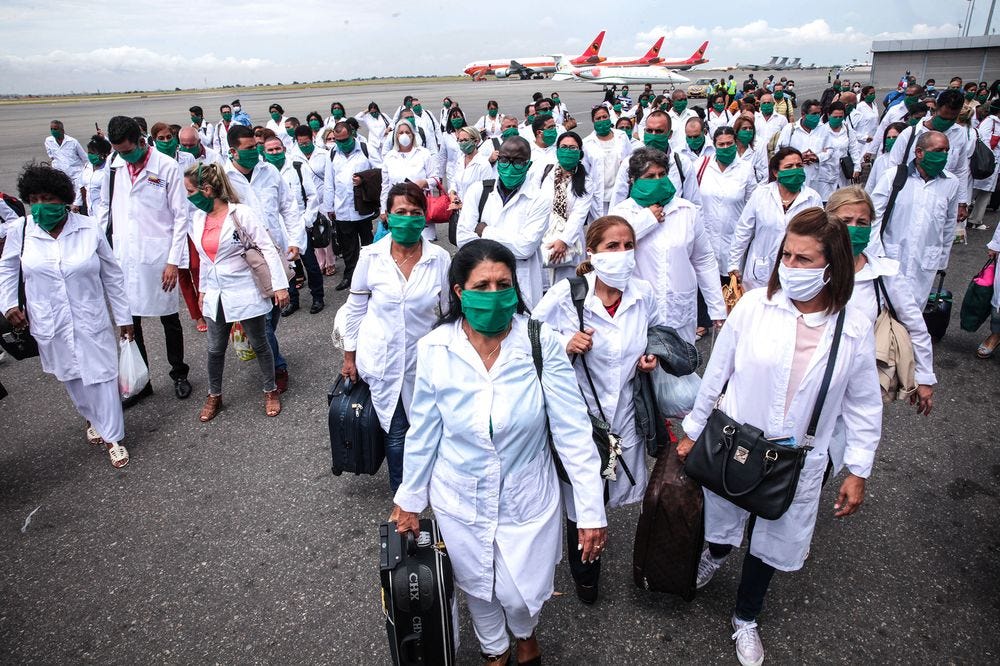On January 29, 2025, an article by Mark Green and Eric Patterson, “The tragic reality of Cuba’s medical brigades,” appeared in The Hill. Green is a Republican member of Congress who represents the seventh district of Tennessee, and Patterson is president and CEO of the Victims of Communism Memorial Foundation.
Green and Patterson maintain that thousands of Cuban medical personnel have been trafficked abroad into forced labor for the profit of “the Cuban regime.” They acknowledge that “these medical professionals do provide needed health care in often difficult environments,” but the motive is financial, in that “the Cuban regime makes a major profit from these programs.”
One wonders, if the Cuban government is earning profits by doing a good thing, why would that be bad? I am reminded of the occasion when Fidel was asked by an international journalist if Cuba was sending doctors to other countries for purposes of propaganda. He responded with the question, “Why don’t the capitalist countries send medical teams throughout the world for reasons of propaganda? We could turn propaganda into a good thing.”
Green and Patterson go on to say that Cuban medical professionals are lured into the international medical programs with promises of travel and excellent pay, but then the medical workers are asked to spy on their workers, receive just a fraction of their wages, work under unsafe conditions, have their passports taken away during their service abroad, and leave their families back home isolated and vulnerable.
On February 25, US Secretary of State Marco Rubio announced restrictions on visas emitted for travel to the USA for officials of any governments that are cooperating with the Cuban overseas medical assistance program. In an article in Amsterdam News on March 13, Bert Wilkinson considered Rubio’s characterization of the Cuban medical brigades as a form of human trafficking to be bizarre. Wilkerson reported that “Caribbean governments have dismissed this notion as absolute nonsense.” He further noted that “regional governments have been reacting with indignation and arguing that any serious disruption to the program could lead to significant upheaval in the health sector.” Antiguan Prime Minister Gaston Browne, for example, declared that the Cuban brigade is critical to the region, and that no one in the Caricom (Caribbean Community) thinks the doctors and nurses are being trafficked. Browne asserted that “if they were to take any punitive action against Caribbean countries because of the involvement of Cubans who are providing healthcare services, they will literally dismantle our healthcare services and put our people at risk.”
Wilkinson correctly concludes: “Cuba and Caricom have enjoyed extremely close, unbroken relations over the past 54 years, since Guyana, Jamaica, Trinidad, and Barbados took steps in 1975 to establish diplomatic relations with the island, largely ending its hemispheric isolation and ignoring backroom threats from Washington about retaliation. The remainder of the bloc soon followed.”
In a visit to Jamaica on March 26, Rubio called the Cuban medical mission program “an atrocious practice.” In a joint press conference with Jamaican Prime Minister Andrew Holness, Rubio diplomatically noted that he recognizes that the Cuban medical program operates differently in different countries, and he was looking forward to engaging with the Prime Minister, to better understand how the program is handled in Jamaica. But, Rubio observed, “in many other parts of the world, [the Cuban] doctors aren’t paid, the Cuban government is. Their passports are taken away. They basically operate as forced labor in many places.” The Jamaican Prime Minister responded during the joint press conference that Cuban doctors are not exploited, that they are treated in accordance with Jamaican and international labor laws, and that Cuban doctors “have been a great help,” since Jamaica has “a shortage of health personnel.”

Cuba responds
Cuba responded to the absurd charges of human trafficking in the Cuba Presidency YouTube program of April 27. The invited guests on the program, in which Cuban President Miguel Díaz-Canel serves as the regular host, were Dr. José Angel Portal Miranda, Cuban Minister of Health; Dr. Carlos Ricardo Pérez, a Cuban medical doctor who has served in five medical missions abroad; and Dr. Luther Castillo, a Honduran medical doctor who is the Minister of Health of Honduras, and who is a graduate of the Latin American School of Medicine in Cuba (participating remotely).
The Cuban President began the program with the observation that the campaign against Cuban international medical missions, conceived and led by US Secretary of State Marco Rubio, alleges that Cuban doctors working in the missions are like slaves, that the Cuban doctors are not paid, and that the Cuban government is enriching itself through the medical missions. Díaz-Canel noted that the US Secretary of State’s tour of the region had the declared objective of breaking the contracts and commitments of the Caribbean governments with respect to the Cuban medical missions. Said contracts, the President declared, are entirely legitimate, and Cuba has the right to turn to medical cooperation with other nations as a source of income.
Minister of Health Portal Miranda asserted that the USA is annoyed by the Cuban medical brigades for two reasons. First, because of the international recognition of the professionalism of Cuban doctors as well as the international solidarity that the program represents. Secondly, because the international medical cooperation contributes to the sustainability of health services in Cuba, thereby undermining the objectives of the US blockade against Cuba.
The Cuban Minister of Health explained that the Cuban policy of medical cooperation with other nations is rooted in the principle of international cooperation among nations in areas of mutual interest, on the basis of equality and mutual respect. The principle has been affirmed and reiterated by the nations of the Global South, based on the concepts and principles of the UN Charter.
Cuba has been sending brigades to other nations for many years, the Cuban minister pointed out. The first brigade was sent to Chile in 1960, following an earthquake. The first permanent brigade was in Algeria in 1963. The program was expanded over the years, and Cuba began sending brigades to other countries in Africa, Latin America, the Caribbean, Asia, and Europe. Cuba has sent 605,000 missionaries in all fields, not only health, to 165 nations. At the present time, Cuba is present in 56 countries with more than 24,000 missionaries.



